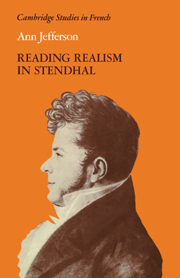Book contents
- Frontmatter
- Contents
- Preface
- PART ONE Introduction
- PART TWO De l'Amour
- PART THREE Le Rouge et le Noir
- 3 Unexpressing the expressible
- 4 The speaking of the quoted word: authors, ironies and epigraphs
- 5 The uses of reading
- PART FOUR Vie de Henry Brulard
- PART FIVE La Chartreuse de Parme
- Conclusion
- Notes
- Bibliography
- Index
- Cambridge Studies in French
4 - The speaking of the quoted word: authors, ironies and epigraphs
Published online by Cambridge University Press: 05 February 2012
- Frontmatter
- Contents
- Preface
- PART ONE Introduction
- PART TWO De l'Amour
- PART THREE Le Rouge et le Noir
- 3 Unexpressing the expressible
- 4 The speaking of the quoted word: authors, ironies and epigraphs
- 5 The uses of reading
- PART FOUR Vie de Henry Brulard
- PART FIVE La Chartreuse de Parme
- Conclusion
- Notes
- Bibliography
- Index
- Cambridge Studies in French
Summary
J'ai une maladie: je vois le langage.
Barthes, Roland BarthesThe authorial voice
In negotiating the déjà-dit, Stendhal is forced to take a different path in Le Rouge from the one traced by its various characters, and, as I have suggested, one of the more significant paths that he follows is that of citation. Unlike Flaubert, however, Stendhal does not offload all citational uses of language on to others by adopting the silence of authorial impersonality for himself. Nor does he figure his author as an objective recorder of history, placed outside the world he is recording, as Balzac does. Stendhal's author is in the world whereof he speaks, since in the Stendhalian scheme of things it would be hypocritical (as well as impossible) to claim to be outside it.
In Stendhal's view, the only way to use language is to use it in the forms in which it is already spoken. As he says in Racine et Shakespeare, ‘Il ne faut pas innover dans la langue parce que la langue est une chose de convention’ (p. 188). The proper use of language requires the same ‘naturel’ that is indispensable to authentic forms of passion. The first reason why ‘le naturel’ is essential to language is that without it speakers become unintelligible: ‘Cette chose que voilà s'appelle une table; la belle invention si je me mets à l'appeler une asphocèle' (ibid.). The second is that, without it, language becomes hypocritical.
- Type
- Chapter
- Information
- Reading Realism in Stendhal , pp. 93 - 112Publisher: Cambridge University PressPrint publication year: 1988



